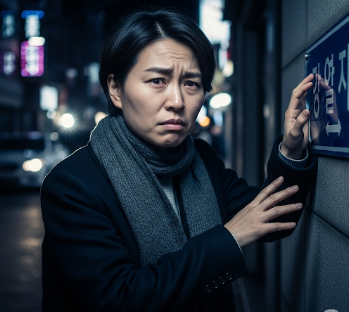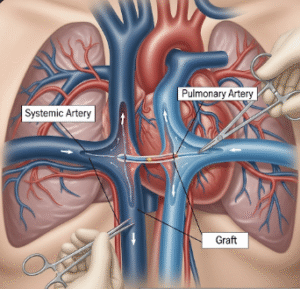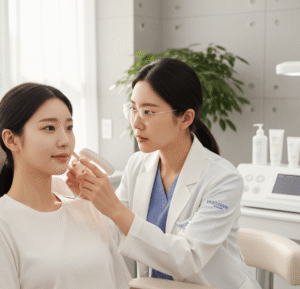Overview
Night blindness, medically known as nyctalopia, is a condition where an individual experiences difficulty seeing in low light or darkness. While some degree of dim-light vision difficulty is normal with age, persistent night blindness can indicate underlying eye disorders or systemic health issues.
In Korea, night blindness is carefully evaluated by ophthalmologists to determine the underlying cause and provide effective treatments, which may include vitamin supplementation, corrective lenses, or surgical interventions depending on the condition.
Key Facts
➤ Night blindness is not a disease itself but a symptom of other eye or systemic conditions.
➤ It may affect one or both eyes.
➤ Causes range from nutritional deficiencies to retinal disorders.
➤ Symptoms may progress gradually or appear suddenly.
➤ Early diagnosis in Korea ensures prevention of complications and improved vision quality.
What is Night Blindness?
Night blindness refers to the inability to see well in dim lighting, such as during nighttime driving, walking in low-light areas, or indoors with insufficient light.
➔ Vision in daylight may remain normal, but the eye struggles to adapt to darkness due to:
- Impaired function of rod photoreceptors, which detect low-light stimuli.
- Insufficient production of rhodopsin, the light-sensitive pigment in rods.
- Structural or degenerative changes in the retina.
Symptoms Related to Night Blindness
➤ Difficulty seeing in low light or darkness.
➤ Slow adjustment of vision when moving from bright to dim environments.
➤ Bumping into objects or tripping in poorly lit areas.
➤ Dependence on artificial light for routine activities at night.
➤ Squinting or straining eyes to improve night vision.
➤ In advanced cases, loss of peripheral vision or complete night blindness.
Causes / Possible Causes
Night blindness can arise from nutritional, ocular, or systemic causes:
Nutritional Causes
➤ Vitamin A deficiency – essential for rhodopsin production in rods.
➤ Malabsorption syndromes, such as celiac disease or Crohn’s disease.
Ocular Causes
➤ Retinitis pigmentosa – a genetic disorder causing progressive rod degeneration.
➤ Cataracts – clouding of the lens reduces light reaching the retina.
➤ Glaucoma or retinal dystrophies affecting retinal function.
➤ Corneal disorders or injuries limiting light entry.
Systemic Causes
➤ Diabetes-related retinopathy affecting night vision.
➤ Liver disorders impairing vitamin A metabolism.
➤ Medication side effects, such as antihistamines or isotretinoin.
Other Factors
➤ Age-related changes in pupil size and lens transparency.
➤ Prolonged exposure to bright light reducing rod sensitivity temporarily.
Risk Factors
➤ Poor nutrition, especially low intake of vitamin A.
➤ Family history of retinal degenerative diseases.
➤ Chronic eye conditions like cataracts or glaucoma.
➤ Systemic diseases affecting the eyes, such as diabetes or liver disease.
➤ Aging, leading to natural decline in rod function.
Complications
If left untreated, night blindness can result in:
➤ Accidents or injuries due to poor night vision.
➤ Progressive retinal degeneration and eventual vision loss.
➤ Difficulty with driving, mobility, and daily activities at night.
➤ Increased eye strain and headaches from squinting.
➤ Secondary psychological effects, such as anxiety or fear of darkness.
When Should I See My Doctor?
Seek medical attention if:
➤ Difficulty seeing in dim light persists or worsens over time.
➤ Night blindness is accompanied by peripheral vision loss or color changes.
➤ There is sudden onset of night vision problems.
➤ Symptoms interfere with driving, walking, or daily functioning.
➤ Associated with other eye symptoms: pain, flashes, or floaters.
Care and Treatment
Lifestyle and Home Measures
➤ Ensure adequate lighting in low-light environments.
➤ Use high-contrast visual aids or reflective markers when walking at night.
➤ Incorporate vitamin A-rich foods (carrots, spinach, liver) in the diet.
➤ Avoid smoking and manage chronic illnesses to maintain eye health.
➤ Routine eye check-ups to monitor retinal and lens health.
Medical Treatments
➤ Vitamin A supplementation for deficiency-related night blindness.
➤ Corrective lenses for refractive errors that worsen low-light vision.
➤ Surgical intervention for cataracts or corneal issues.
➤ Management of underlying systemic or retinal conditions.
➤ Use of ocular lubricants or protective eyewear for sensitivity and glare reduction.
Preventive Measures
➤ Balanced diet with essential vitamins and nutrients.
➤ Early detection of retinal or ocular disorders through screenings.
➤ Avoid prolonged exposure to bright artificial light.
➤ Regular ophthalmologic evaluations, especially for high-risk individuals.
Treatment Options in Korea
Korean healthcare provides comprehensive care for night blindness, including:
Diagnostic Services
➤ Comprehensive eye exams including retinal imaging and visual field tests.
➤ Blood tests to assess vitamin levels and systemic conditions.
➤ Genetic testing for inherited conditions like retinitis pigmentosa.
Therapies and Supportive Care
➤ Vitamin supplementation and nutritional counseling.
➤ Surgical options such as cataract removal or corneal correction.
➤ Low-vision aids and adaptive tools for daily life.
➤ Advanced management for retinal diseases with laser therapy or injections.
➤ Multidisciplinary approach combining ophthalmology, nutrition, and rehabilitation.
✅ In summary: Night blindness (nyctalopia) is a condition characterized by difficulty seeing in low light, often caused by nutritional deficiencies, retinal disorders, or systemic diseases. In Korea, early diagnosis, targeted treatment, and supportive care can prevent complications, improve vision, and maintain quality of life.













